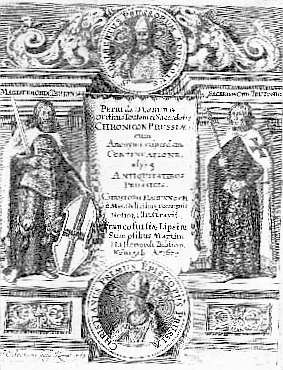
Chronicon terrae Prussiae
Encyclopedia

Latin
Latin is an Italic language originally spoken in Latium and Ancient Rome. It, along with most European languages, is a descendant of the ancient Proto-Indo-European language. Although it is considered a dead language, a number of scholars and members of the Christian clergy speak it fluently, and...
for "The Chronicle of the Prussian Land") is a chronicle
Chronicle
Generally a chronicle is a historical account of facts and events ranged in chronological order, as in a time line. Typically, equal weight is given for historically important events and local events, the purpose being the recording of events that occurred, seen from the perspective of the...
of the Teutonic Knights
Teutonic Knights
The Order of Brothers of the German House of Saint Mary in Jerusalem , commonly the Teutonic Order , is a German medieval military order, in modern times a purely religious Catholic order...
, by Peter of Dusburg
Peter of Dusburg
Peter of Dusburg , also known as Peter of Duisburg, was a Priest-Brother and chronicler of the Teutonic Knights. He is known for writing the Chronicon terrae Prussiae, which described the 13th and early 14th century Teutonic Knights and Old Prussians in Prussia.Peter's dates of birth and death are...
, finished in 1326. The manuscript is the first major chronicle of the Teutonic Order
Monastic State of the Teutonic Knights
The State of the Teutonic Order, , also Monastic State of the Teutonic Knights or Ordensstaat , was formed in 1224 during the Northern Crusades, the Teutonic Knights' conquest of the pagan West-Baltic Old Prussians in the 13th century....
in Prussia
Prussia (region)
Prussia is a historical region in Central Europe extending from the south-eastern coast of the Baltic Sea to the Masurian Lake District. It is now divided between Poland, Russia, and Lithuania...
and the Grand Duchy of Lithuania
Grand Duchy of Lithuania
The Grand Duchy of Lithuania was a European state from the 12th /13th century until 1569 and then as a constituent part of Polish-Lithuanian Commonwealth until 1791 when Constitution of May 3, 1791 abolished it in favor of unitary state. It was founded by the Lithuanians, one of the polytheistic...
, completed some 100 years after the conquest of the crusaders
Prussian Crusade
The Prussian Crusade was a series of 13th-century campaigns of Roman Catholic crusaders, primarily led by the Teutonic Knights, to Christianize the pagan Old Prussians. Invited after earlier unsuccessful expeditions against the Prussians by Polish princes, the Teutonic Knights began campaigning...
into the Baltic region
Baltic region
The terms Baltic region, Baltic Rim countries, and Baltic Rim refer to slightly different combinations of countries in the general area surrounding the Baltic Sea.- Etymology :...
. It is a major source for information on the Order's battles with Old Prussians
Old Prussians
The Old Prussians or Baltic Prussians were an ethnic group, autochthonous Baltic tribes that inhabited Prussia, the lands of the southeastern Baltic Sea in the area around the Vistula and Curonian Lagoons...
and Lithuanians
Lithuanians
Lithuanians are the Baltic ethnic group native to Lithuania, where they number around 2,765,600 people. Another million or more make up the Lithuanian diaspora, largely found in countries such as the United States, Brazil, Canada, Colombia, Russia, United Kingdom and Ireland. Their native language...
.
The chronicle is written in Latin
Latin
Latin is an Italic language originally spoken in Latium and Ancient Rome. It, along with most European languages, is a descendant of the ancient Proto-Indo-European language. Although it is considered a dead language, a number of scholars and members of the Christian clergy speak it fluently, and...
and consists of four volumes. The first volume gives the background of the Order and its crusades in Outremer
Outremer
Outremer, French for "overseas", was a general name given to the Crusader states established after the First Crusade: the County of Edessa, the Principality of Antioch, the County of Tripoli and especially the Kingdom of Jerusalem...
. The second volume narrates how the Order arrived to the Prussian land, while the third volume details wars with Old Prussians and other Baltic tribes. The fourth volume provides a historical context of other contemporary events in the world. The chronicle has an addendum of another 20 chapters dealing with events of 1326-1330. It might also have been written by Peter of Dusburg. The chronicle is based on local monastery annals, chronicles, reports and narrations which Peter "considered reliable". Peter had access to the Grand Masters' archive in Marienburg
Malbork Castle
The Marienburg Castle in Malbork is by area the largest castle in the world. It was built in Prussia by the Teutonic Knights, a German Roman Catholic religious order of crusaders, in a form of an Ordensburg fortress. The Order named it Marienburg...
and witnessed some events himself.
The chronicle contains some ethnographic data about the Old Prussians, the indigenous people conquered by the Order. It provides numerous chapters in the styles of religious visions, miracles, and hagiography
Hagiography
Hagiography is the study of saints.From the Greek and , it refers literally to writings on the subject of such holy people, and specifically to the biographies of saints and ecclesiastical leaders. The term hagiology, the study of hagiography, is also current in English, though less common...
, aimed at the glorification of the mission of the Order. The war against pagans is sacred and all knights who perish go to heaven. Peter takes no interest in domestic policy of the Order; he does not describe cities, trade, or colonization. Rather the chronicle describes minor raids and clashes with great detail. While narratives of events and battles are considered to be reliable, ethnographic data is ideologically charged. As a priest Peter tried to teach the reader. Pagan Prussians and Lithuanians are presented as a moral example. They are pious in their own way, and Christians should be ashamed of their disobedient and sinful ways.

